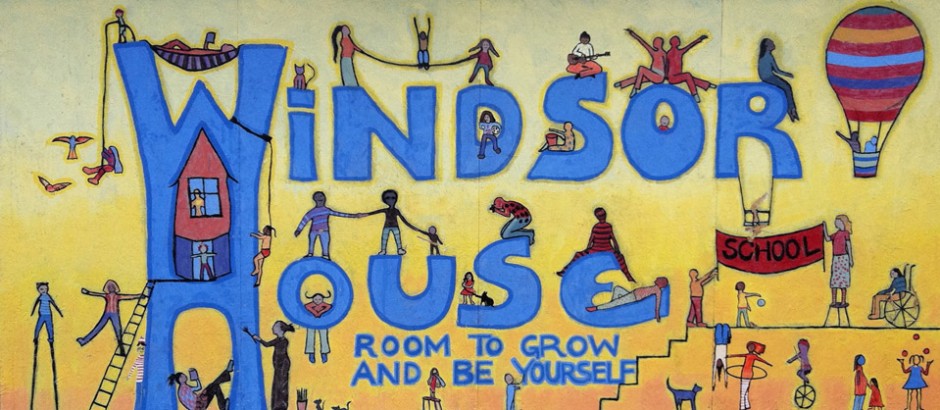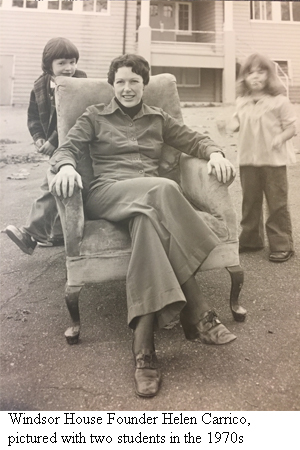Room to Grow and Be Yourself: The Rise and Fall of Vancouver’s Only Democratic Public School

Room to grow and be yourself, a simple exclamation, and without any context, a seemingly innocuous one. However, it was this sentence that served as the slogan for North Vancouver’s Windsor House school during their final years, and behind these words exists a fascinating tale of a school that resisted the pressures of conformity for over 45 years. Born out of necessity, Windsor House was founded by Helen Carrico with the intention of providing an alternative education environment for both her daughter and the children within their community. Often referred to as a ‘free school’ Windsor house, along with many other schools of a similar nature, was modeled after the British democratic school known as Summerhill. Claiming the title of “the original alternative ‘free’ school” Summerhill, which was founded by A.S. Neill’s in 1921, is an institution that takes pride in facilitating an educational experience “free from the many anxieties and neurosis of the outside world”. Windsor house, after opening their doors in 1971, sought to establish a learning environment parallel to that of what was being provided at Summerhill (“A Co-Educational Boarding School in Suffolk England,” n.d.). And it was not long after the Establishment of Windsor House that they were taken in by the North Vancouver School District in what Carrico describes as “an expression of the 1970’s zeitgeist” alluding to their short lived status as a token alternative school in a time when such educational diversity was cherished by society (H. Carrico, personal communication, November 17, 2019). Unfortunately, for the Windsor House community, this designation -along with bellbottoms and Keynesian economics- would be left behind in the 1970’s, and before them lay a future filled with bureaucrats’ and budget cuts (W. Brazelton, 1986).
With the exception of a brief shift in social thinking during the late 1960’s and 70’s, our western models of pedagogy have followed a “one-size-fits-all” approach since before the conception of our modern school system by Horace Mann in 1837 (Dobozy, 2007) (Moss, 2011). Students whose learning styles deviate from this stringent model are often left believing they are unintelligent because they do not fit within our cookie-cutter definitions of education. Windsor House was a place that strived to ameliorate this problem and to challenge our traditional perceptions of learning, and while the influence of student-involved democracy fluctuated over the years, Windsor House was unwavering in their pursuit to deconstruct our notions of educational hierarchy (Correia et al, 2019) (H. Carrico, personal communication, November 17, 2019). So, as Windsor house took on various incarnations over the years, whilst maintaining a clearly defined constitution, it was changes to the system under which they operated that would ultimately result in their demise.
In May of 2019 Windsor House was let go from the Gulf Island School District. This came as a result of the $570.000 deficit the school had been running over the past two years. And following a final plea to the Vancouver School Board, requesting that Windsor house be granted a space within their jurisdiction, the school was forced to close its doors for good in June of 2019 (CBC News, 2019). However, these dismissals were not a result of individuals at the school board level holding contempt towards Windsor House, but rather, the product of a system that possesses no additional space in their budgets for alternative education programs. In fact, the margins of public education are so thin that even the school boards with higher than average registration are forced to make cuts to seemingly essential programs. Take for example that in February of 2019 the city of Vancouver cut school board funding to its Food4Schools program by over $150.000, leaving low-income families fearing that these cuts would jeopardize the free lunch subsidies which hundreds of students benefit from daily (CBC News, 2019). This cutting back of public spending on education is simply a by-product of how we have monetized education in our post-neo-liberal world. As our society has moved towards free markets and small government, we have forced our public schools to adopt a profit-oriented model in order to make up for lost funding. During my Interview with Helen, she spoke of a time when auditors would come to the school and identify areas that were lacking and see to it that funding be allocated in order to remedy the problem. But by the mid 1990’s, as the endemic spread of Neo-liberalism continued outwards from the United States, the auditors visit became a practice of stripping funds and reducing programs. Moreover, while conducting research for this piece, I found myself reading a CBC article on the closure of Windsor House, below this article there was a section where readers could provide feedback regarding the piece. The top comment on this section read “The Intelligent, idealistic creatives who start and run these establishments often lack the business acumen required to keep them going and then run into problems down the road when the funding doesn’t keep up with the spending”. I feel this comment illustrates perfectly a more intricate part of the greater problem. Due in part because the teachers who run schools like Windsor House, who are in fact idealistic and intelligent individuals, are required to serve as both educators and business-people; forcing them to come up with ways of improving the financial stability of their school, whilst providing to their students the top-notch education they deserve. Furthermore, during my interview with Helen, she talked briefly about how the democratic label that Windsor House assigned itself was as much a brand differentiator as it was a legitimate way of running the school. Putting such dual responsibility on the individuals who run these types of schools is an unfair practice which inhibits the institutions ability to flourish. Windsor House did not generate an easily quantifiable profit, taken at face value it was a school that had high costs of operation with an extremely low return. However, Windsor House was a place free from the external pressures of mainstream public school, thus creating an environment for students to realize their full potential; and it was the production of these self-actualized individuals that made Windsor house a unique an invaluable asset to British Columbia’s educational community. (Katwyk et al, 2014).

Upon hearing that Windsor House would not be reopening this past fall I took a brief and unaffectionate look back at the time I spent in mainstream public school. It was there, between grades 8 and 10, that my post-secondary prospects were suffocated by a system which did not cater to individuals like myself. In a desperate act of self-preservation, I arrived at Windsor House depleted of confidence and hoping only to graduate with as little resistance as possible, what I found instead was a place that allowed me to have what can only be described as an intellectual awakening. So, while I am certainly bias towards this subject, I think it is clear that Windsor House provides a perfect touch stone off of which to observe and critique the problems that exist within our current education system, but also, to illustrate how these problems are a result of flaws within the greater political-economic system. Without changes to these overarching structures of power, the public-school system will continue to lack the funding necessary to operate as an environment that fosters educational diversity.
Below you will find an audio file containing my interview with Helen Carrico, please feel free to take a listen.
Works Cited
“A Co-Educational Boarding School in Suffolk England – The Original Alternative ‘Free’ School” (n.d.) Retrieved from http://www.summerhillschool.co.uk
“North Vancouver Alternative School to Close After unanimous Vote”. (May 14, 2019) CBC News. Retrieved from https://www.cbc.ca/news/canada/british-columbia/windsor-house-school-closing-1.5134853
“Parents Concerned Who Will Pay for Lunches After Vancouver Slashes Spending”. February 13, 2019. CBC News. Retrieved from https://www.cbc.ca/news/canada/british-columbia/vancouver-school-lunches-funding-1.5016974
Brazelton, W.R. (1986). The Rise and Fall of Keynesian Economics. Journal of Economic Issues. 20(3), 853. Retrieved from https://eds.b.ebscohost.com/eds/detail/detail?vid=4&sid=fecebbd9-9507-41ed-87c4-7a512b9852f4%40pdc-v-sessmgr02&bdata=JnNpdGU9ZWRzLWxpdmUmc2NvcGU9c2l0ZQ%3d%3d#AN=4674450&db=bth
Carrico, H. (2019, November 17). Personal interview.
Correia, N. Camillo, C. Aguiar, C. Amaro, F. (May 2019) Children’s Right to Participate in Early Childhood Education Settings: A Systematic Review. Elsevier Ltd. Retrieved from https://eds.b.ebscohost.com/eds/detail/detail?vid=3&sid=f0cf7597-fcee-4afa-8e1f-df1da51674a8%40sessionmgr102&bdata=JnNpdGU9ZWRzLWxpdmUmc2NvcGU9c2l0ZQ%3d%3d#AN=S0190740918309770&db=edselp
Dobozy, E. (2007, May 2nd) Effective Learning of Civic Skills: Democratic Schools Succeed in Nurturing the Critical Capacities of Students. Educational Studies. Retrieved from https://www-tandfonline-com.ezproxy.capilanou.ca/doi/pdf/10.1080/03055690601068279
Katwyk, T.V. Liegghio, M. Laflamme, L. Democratic Learning: The Study Circle as a Critical Approach to Social Work Education. (2014) Wilfrid Laurier University Press. Retrieved from https://eds.b.ebscohost.com/eds/resultsadvanced?vid=14&sid=0a969033-f07e-43a2-9155-4cecc0afc80e%40sessionmgr102&bquery=Democratic+Learning%3a+the+Study+Circle&bdata=JmNsaTA9RlQxJmNsdjA9WSZ0eXBlPTEmc2VhcmNoTW9kZT1BbmQmc2l0ZT1lZHMtbGl2ZSZzY29wZT1zaXRl
Moss, H. (2011) Horace Mann’s Troubling Legacy: The Education of Democratic Citizens (review). The University of North Carolina Press. Retrieved from https://eds.b.ebscohost.com/eds/detail/detail?vid=7&sid=fecebbd9-9507-41ed-87c4-7a512b9852f4%40pdc-v-sessmgr02&bdata=JnNpdGU9ZWRzLWxpdmUmc2NvcGU9c2l0ZQ%3d%3d#AN=edspmu.S2159980711300076&db=edspmu
